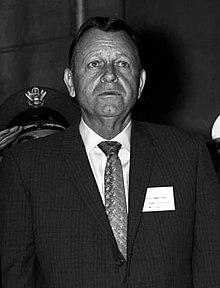INFORMATION
| Artist Birtday : | Invalid date format. |
| Born In : | Jackson Parish, Louisiana, U.S |
James Houston Davis (September 11, 1899 – November 5, 2000) was an American politician, singer and songwriter of both sacred and popular songs. Davis was elected for two nonconsecutive terms from 1944 to 1948 and from 1960 to 1964 as the governor of his native Louisiana.
Davis was a nationally popular country music and gospel singer from the 1930s into the 1960s, occasionally recording and performing as late as the early 1990s. He appeared as himself in a number of Hollywood movies. He was inducted into six halls of fame, including the Country Music Hall of Fame, the Southern Gospel Music Association Hall of Fame, and the Louisiana Music Hall of Fame. At the time of his death in 2000, he was the oldest living former governor as well as the last living governor to have been born in the 19th century.
Early life
Davis was born to a sharecropping couple, the former Sarah Elizabeth Works (1877–1965) and Samuel Jones Davis (1873–1945), in Beech Springs, southeast of Quitman in Jackson Parish, north Louisiana. It is now a ghost town.[1]
The family was so poor that young Jimmie did not have a bed in which to sleep until he was nine years old. Davis was not sure of his date of birth; according to the New York Times, «Various newspaper and magazine articles over the last 70 years said he was born in 1899, 1901, 1902 or 1903. He told The New York Times several years ago that his sharecropper parents could never recall just when he was born – he was, after all, one of 11 children – and that he had not had the slightest idea when it really was.» The birth date listed on his Country Music Hall of Fame plaque is September 11, 1902. The 1900 US Census recorded his birth as September 1899, which his parents would have told the census taker.
Davis graduated from Beech Springs High School and the New Orleans campus of Soule Business College. Davis received his bachelor’s degree in history from the Baptist-affiliated Louisiana College in Pineville in Rapides Parish. He received a master’s degree from Louisiana State University in Baton Rouge.
His 1927 master’s thesis, which examines the intelligence levels of different races, is titled Comparative Intelligence of Whites, Blacks and Mulattoes.
During the late 1920s, Davis taught history (and, unofficially, yodeling) for a year at the former Dodd College for Girls in Shreveport. The college president, Monroe E. Dodd, who was also the pastor of the large First Baptist Church of Shreveport and a pioneer radio preacher, invited Davis to join the faculty.
Musical career
Davis became a commercially successful singer of rural music before he entered politics. His early work was in the style of country music singer Jimmie Rodgers. Davis was also known for recording energetic and raunchy blues tunes such as «Red Nightgown Blues». Some of these records included slide guitar accompaniment by black bluesman Oscar «Buddy» Woods. During his first run for governor, opponents reprinted the lyrics of some of these songs in order to undermine Davis’s campaign. In one case, anti-Davis forces played some records over an outdoor sound system, only to give up after the crowds started dancing, ignoring the double-entendre lyrics. Until the end of his life, Davis never denied or repudiated those records.
In 1999, «You Are My Sunshine» was honored with a Grammy Hall of Fame Award, and the Recording Industry Association of America named it one of the Songs of the Century. «You Are My Sunshine» was ranked in 2003 as No. 73 on CMT’s 100 Greatest Songs in Country Music. Until his death, Davis insisted that he wrote the song. Virginia Shehee, a Shreveport businesswoman, philanthropist, and state senator, introduced legislation to designate «You Are My Sunshine» as the official state song.[6] The song was reportedly written for Elizabeth Selby, a resident of Urbana, IL and housemother of Wescoga, Wesley Co-Op for Gals at the time the song was written.
Davis often performed during his campaign stops when running for governor of Louisiana. After being elected in 1944, he became known as the «singing governor.» While governor, he had a No. 1 hit single in 1945 with «There’s a New Moon Over My Shoulder». Davis recorded for the Victor Talking Machine Company, and Decca Records for decades and released more than 40 albums.
A long-time Southern Baptist, Davis recorded a number of Southern gospel albums. In 1967 he served as president of the Gospel Music Association. He was a close friend of the North Dakota-born band leader Lawrence Welk, who frequently reminded viewers of his television program of his a*sociation with Davis.
A number of his songs were used as part of motion picture soundtracks. Davis appeared in half a dozen films, including one starring Ozzie and Harriet, who had a TV series under their names. Members of Davis’s last band included Allen «Puddler» Harris of Lake Charles. He had served as pianist for singer Ricky Nelson early in his career.
He was also a close acquaintance of the country singer-songwriter Hank Williams, with whom he authored the top-10 hit[7] «(I Heard That) Lonesome Whistle» back in 1951, supposedly on a fishing day they spent together.

